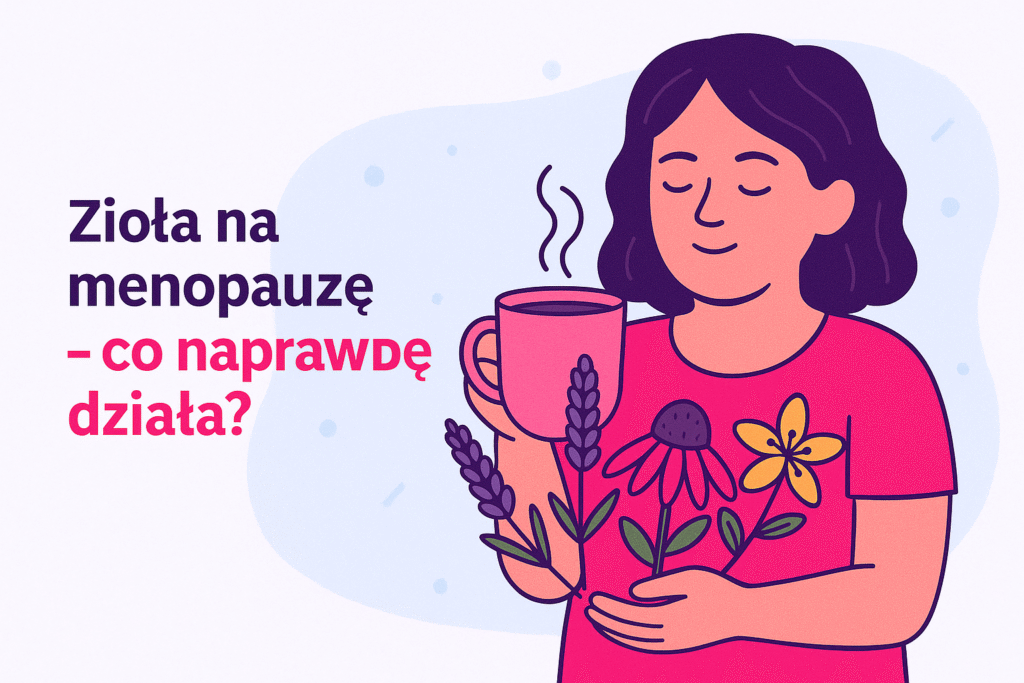Herbs for Menopause – What Really Works?
Many women going through menopause look for natural ways to relieve symptoms such as hot flashes, mood swings, insomnia, or vaginal dryness. Herbs are one of the oldest forms of support for women’s hormonal health and are increasingly popular among those who avoid hormone replacement therapy (HRT). But which herbs are truly effective, and which are overrated? In this article, we discuss the most effective menopause herbs – based on scientific research and expert opinions.
Can herbs replace HRT?
Herbs are not equivalents of HRT – they do not contain human hormones. However, many of them exhibit estrogen-like, calming, adaptogenic, or tonifying effects, which can help ease menopausal symptoms.
Their effectiveness depends on:
- the type of symptoms (e.g., hot flashes vs. insomnia),
- the severity of hormonal changes,
- duration and consistency of use,
- individual body characteristics.
Some herbs may be particularly helpful for mild to moderate symptoms, especially during perimenopause.
Top Herbs for Menopause – Scientific Review
1. Black Cohosh (Cimicifuga racemosa)
Effect: alleviates hot flashes, excessive sweating, irritability, insomnia
Mechanism: likely acts on serotonin and dopamine receptors⁽¹⁾
Scientific evidence: A Cochrane meta-analysis confirmed its effectiveness in relieving menopausal symptoms without estrogenic activity⁽²⁾
Dosage: 40–80 mg daily of standardized extract
Note: not recommended for women with liver conditions
2. Red Clover (Trifolium pratense)
Effect: reduces hot flashes, improves bone density and lipid profile
Mechanism: contains isoflavones – phytoestrogens (genistein, daidzein)⁽³⁾
Scientific evidence: some studies show up to a 30% reduction in symptoms after 12 weeks⁽⁴⁾
Dosage: 40–80 mg of isoflavones per day
Note: use cautiously in women with hormone-sensitive cancers
3. Chaste Tree (Vitex agnus-castus)
Effect: regulates menstrual cycle, improves mood, reduces mastalgia
Mechanism: acts on the pituitary gland and prolactin levels
Scientific evidence: effective in perimenopause and premenstrual syndrome (PMS)⁽⁵⁾
Dosage: 20–40 mg per day of fruit extract
Note: effects may appear after several weeks of use
4. Maca (Lepidium meyenii)
Effect: increases energy, improves libido, mood, and mental resilience
Mechanism: adaptogen; affects the hypothalamic–pituitary–adrenal axis, not directly estrogenic⁽⁶⁾
Scientific evidence: improves mood and libido in postmenopausal women⁽⁷⁾
Dosage: 1.5–3 g of powdered root daily
Note: no known side effects with short-term use
5. St. John’s Wort (Hypericum perforatum)
Effect: relieves depression, anxiety, irritability
Mechanism: inhibits reuptake of serotonin, dopamine, norepinephrine⁽⁸⁾
Scientific evidence: efficacy comparable to mild antidepressants⁽⁹⁾
Dosage: 300 mg of standardized extract 2–3 times daily
Note: strong interactions with medications (e.g., contraceptives, heart medications)
Other Helpful Herbs for Menopause
- Sage: reduces sweating and hot flashes
- Lemon balm, valerian, passionflower: calming effect, improves sleep quality
- Ginseng: boosts energy and libido (note: may raise blood pressure)
- Ashwagandha: adaptogen that supports stress and anxiety resilience
Can herbs be combined?
Yes – provided they don’t interact and are used as directed. Many formulations combine, for example, black cohosh with lemon balm, red clover with vitamin D, or chaste tree with vitamin B6.
Example ready-made combinations:
- Black cohosh + lemon balm + magnesium (for hot flashes and sleep)
- Red clover + calcium + vitamin D (for bones and vasomotor symptoms)
When are herbs not recommended?
- In women with a history of breast or endometrial cancer (phytoestrogens – only under medical supervision)
- In liver diseases (e.g., black cohosh)
- In combination with antidepressants, heart medications, contraceptives (e.g., St. John’s wort)
Summary
Herbs for menopause can be an effective and safe support, especially for women who prefer a natural approach or cannot use HRT. The key is choosing the right herbs for the symptoms, patience, and consistency. It is worth choosing standardized products and always consulting a doctor or herbal specialist, especially in the case of chronic conditions or when taking medications.
References
- Wuttke W et al. Cimicifuga racemosa extract for treating climacteric complaints. Planta Med. 2003.
- Leach MJ, Moore V. Black cohosh (Cimicifuga spp.) for menopausal symptoms. Cochrane Database Syst Rev. 2012.
- Baber RJ et al. Isoflavones for menopausal symptoms. Climacteric. 2011.
- Atkinson C et al. The effects of red clover isoflavones on menopausal symptoms. BJOG. 2004.
- van Die MD et al. Vitex agnus-castus extracts for female reproductive disorders. Planta Med. 2013.
- Brooks NA et al. Beneficial effects of Lepidium meyenii (Maca) on psychological symptoms in postmenopausal women. Menopause. 2008.
- Gonzales GF. Biological effects of Lepidium meyenii. Evid Based Complement Alternat Med. 2012.
- Linde K et al. St John’s wort for depression. Cochrane Database Syst Rev. 2008.
- Rahimi R et al. Hypericum perforatum in the treatment of depression. Phytomedicine. 2009.

